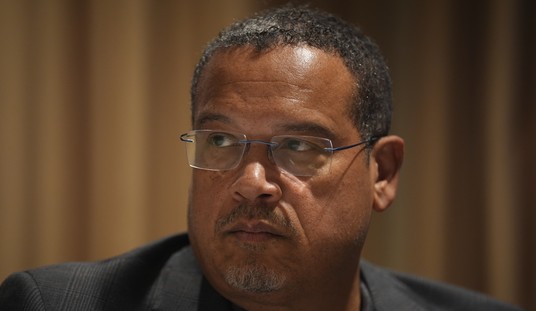In truth, the best possible spin on the Middle East peace process before John Kerry warned Israel about becoming an “apartheid state” was that it was on life support. The Washington Post declares the project DOA, blaming intransigence on the part of the participants rather than Kerry’s gaffe-ridden approach. And wasn’t Kerry arguing that he would be the one man able to bridge that intransigence through his diplomatic brilliance?
Nine months after it began, the Obama administration’s marquee diplomatic effort to broker a peace deal between Israel and the Palestinians ended Tuesday with neither a whimper nor much of a bang.
The initiative pressed by Secretary of State John F. Kerry revived a brand of Middle East shuttle diplomacy made popular in the disco era and included a hundred closed-door meetings in a half dozen world capitals. But the talks reached their expiration date with each side blaming the other (and the United States) for the impasse and saying that neither saw a true partner for peace in the other.
That “disco era” wisecrack has to sting a bit, but it’s not far from the truth. It’s also not far from the results that shuttle diplomacy provided back in the day, mainly because the issues have little to do with the miles traveled by an American Secretary of State. The reunion between Fatah and Hamas more or less proves that, as Hamas refuses to recognize Israel nor disavow violence, despite having its own territory now in Gaza.
The Post’s William Booth and Ruth Eglash parse out the blame:
The Palestinians argue that Israel was looking for an excuse to end the talks and found cause in that reconciliation between Hamas, which controls the Gaza Strip, and Fatah, which controls politics in the West Bank. The two factions split in 2007 after Hamas seized power in Gaza.
“Israel never gave the negotiations a chance to succeed,” said Saeb Erekat, the Palestinians’ chief negotiator, on Tuesday. “If this Israeli government were sincerely interested in peace,” he said, “it would have taken Palestinian national reconciliation as an opportunity for peace rather than an opportunity for a new blame game.” …
“We’re not going to negotiate with a government backed by Hamas unless Hamas changes its position and says it’s willing to recognize Israel,” Netanyahu said Sunday on CNN’s “State of the Union.”
The Post never mentions that Hamas has been firing rockets into Israel as Fatah signed that reconciliation agreement. That might be one reason that Israel doesn’t believe Hamas to be a partner for peace, no? The problem of Palestinian demands for Israel’s destruction existed before Kerry took over from Hillary Clinton, of course, but his central conceit was that his diplomacy was going to be different. It turned out to be the same old thing, and it left the situation arguably worse.
In fact, State Department spokesperson Jen Psaki couldn’t name a single benefit for Israelis or Palestinians of Kerry’s talks when pressed by the Associated Press’ Matt Lee, except for the prisoner releases (via the Free Beacon):
Politico’s Edward-Isaac Dovere is hard pressed to come up with a single Kerry initiative that’s succeeding:
Name one high-profile issue that’s going well right now for Secretary of State John Kerry. …
Even as Kerry and Obama have brought together allied international action on Ukraine, Iran and elsewhere, his administration has been under attack at home and abroad for not being better able to showcase strength or effectiveness toward Russia and Syria.
Amid that criticism, Kerry is the face of the administration foreign policy, whether announcing the preliminary breakthrough with Iran in November — still moving forward, at least for now — or standing in Geneva again two weeks ago to cautiously accept the basic agreement with the Russians, now proven useless, to de-escalate Ukraine.
And then there’s his own decision to making a renewed Middle East peace effort a central mission, which continues to have Obama’s support and which hasn’t been affected by the “apartheid” comment or the response it’s generated.
After the “apartheid” comment, which not only put the nail in the coffin of the peace talks but may have permanently damaged Kerry’s ability to interact with Israel, Senator Ted Cruz demanded his resignation. Politically, Barack Obama can’t sustain another Cabinet change before the midterms, but diplomatically, Kerry’s turning into a walking catastrophe that Obama can’t sustain for much longer, either. The best Obama can hope is that Kerry keeps his foot out of his mouth for a few months longer, but the President may need to pick a special envoy for Israel in the meantime to bypass Kerry and his foot-in-mouth disease.
Update: Walter Russell Mead reminds us that this is Obama’s foreign policy, even if Kerry is the incompetent in charge of it at the moment:
It’s clear that the White House is beginning to understand that even American liberals have to work hard these days to continue to believe that the President is doing a good job in foreign affairs. Unfortunately, it is less clear that the White House knows what to do about the situation.
But neither the President nor Ben Rhodes (who is cited later in the article) appear to be taking on the reason so many of the president’s sympathizers are shaking their heads over the state of American foreign policy today. It is clear to a child of ten that the President and all the people around him totally failed to understand the first thing about Vladimir Putin and his foreign policy agenda. They were caught utterly flatfooted by his move on Ukraine. To both the average layperson and the seasoned foreign policy professional, this looks like a major misreading of a major issue. Many will wonder how an administration that was listening in to Angela Merkel’s cell phone calls could have misread Russia so comprehensively.
A public failure of this magnitude, (comparable in a way to George W. Bush launching a war to stop a WMD program that he then failed to find) is profoundly damaging to public confidence in a political leader.
Via Instapundit.








Join the conversation as a VIP Member